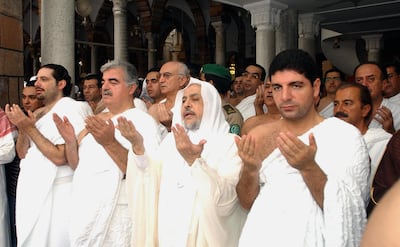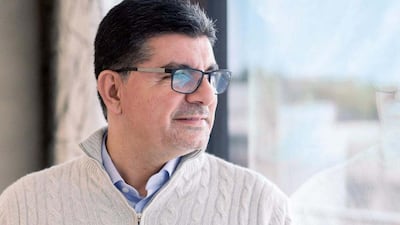It is 20 years since Bahaa Hariri voted in a Lebanese election.
After the assassination of his father Rafik Hariri in 2005, the heir apparent to Lebanon’s most influential family withdrew to Paris, where he has spent the past 15 years managing a business empire. Consumed with grief, he had no interest in following his father’s legacy.
Yet with the country reeling in a political crisis and economic collapse, he is getting back in the game. The eldest Hariri son is launching a new cross-sectarian political movement.
So, what changed?
“It was the Beirut explosion. I just couldn't sit down and do nothing,” he told The National.
Today, he is the man, and the money, behind Sawa Li Lubnan, a nascent political movement which, this week, announced it was fielding a cross-sectarian list in the coming elections.
“We are trying to do things differently,” he said.
That much is obvious. Absent from the thousands of Sawa billboards across Beirut is his face and the family name.
He has brought on board some of the most successful political consultants in the world. The messaging is strict and disciplined. They are polling extensively — they believe they have a better idea of what the Lebanese people want than anyone else. This is a slick operation that might seem more fitting for a general election in the UK or a state governor race in the US.
Yet, the odds are stacked against Sawa. Elections in Lebanon have long been dominated by issues of sect and clientelism. Paying people to vote one way or another is not uncommon. Messaging is rarely seen as a determining factor.
The Lebanese political system, which operates on confessionalism and allocates power proportionally among the country's communities, has sectarianism built into it. Mr Hariri said he is reaching out across a divide — one that only appears to have worsened with the political crisis.
“Us as Hariris, we crossed that bridge,” he said.

He reels off a list of Christian and Druze figures who prospered under in his father's business empire. In the family business, there is no place for sectarianism. It is a practice he is trying to implement politically.
“As we started with our own life, in business and our private lives, we believe the only way for Lebanon to move forward is through a cross-sectarian way,” he said.
The protests that rocked the country from October 2019 seemed a wholesale rebuke of the political class who have dominated post-civil war Lebanon. “All of them means of all of them,” was the enduring cry. When it is suggested to him that the call includes families just like his, he is not perturbed.
“That’s for the Lebanese people to judge, no one else. This is a decision solely for the Lebanese it's not for the pundits and the experts,” he said.
Mr Hariri takes an exceptionally strong line on Hezbollah. This is unsurprising — after all, it was individuals from the group who were found responsible by the Special Tribunal for Lebanon for his father’s murder.
“We will not compromise with a terrorist organisation,” he said. “Hezbollah and its arms, everything about it must be disbanded. There is no compromise on that.”

Alongside Sawa, there is SBI, a TV network that Mr Hariri is pouring money into to develop the country’s free press.
He is furious at the recent collapse in Lebanon’s relations with the Gulf following comments by Information Minister George Kordahi over the war in Yemen.
“We saw what happened with the GCC — to me that was a disaster,” he said.
He is worried it could get a lot worse.
“The GCC barely took out their finger, maybe not even the nail of the finger, and look what happened.”
On the surface, it seems a contradiction that, by doing things so differently, Mr Hariri is hoping to play a part in reviving the country his father built.
Sawa has been born out of the same frustrations that drove the young and unemployed to the streets two years ago, an acknowledgement that the show cannot just go on.
That the son of Lebanon’s most prominent family has turned against that very system is an indicator of just how much the country’s political culture has changed. Whether that means Sawa can pick up any seats in parliament is another question.


